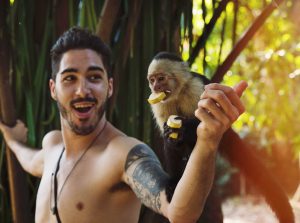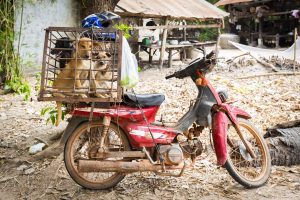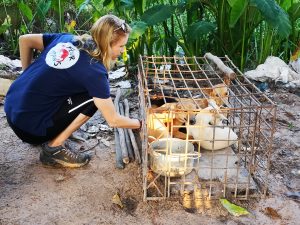By Daniel Turner, Director, ANIMONDIAL
As lockdowns are eased across the world, we have a choice of returning to ‘business as usual’, or taking greater responsibility for our actions, protect nature, and work towards a better future.
In our previous blog produced for ATTA, ANIMONDIAL, the specialist responsible animal tourism consultancy, acknowledged we are entering the “Planetary Era”, where businesses strive to adopt a more humane and sustainable approach, and Act #ForNature. Although, as we recover from business paralysis, we must also do all we can to build our resilience and do what is necessary to prevent a further pandemic from happening again.

According to the World Health Organization (WHO), 70 percent of human diseases discovered in the past 50 years were caused by disease originating from animals. These are known as zoonoses, or zoonotic diseases, which can pass between vertebrate animals (including humans). Zoonoses consist of bacterial infections, such as Salmonella, but also fungal infections and viruses (i.e. Ebola, Avian Influenza (H5N1), SARS and COVID-19). The greater the exposure between humans and other animals, particularly where the animals are experiencing undue distress, the greater the risk of zoonotic disease transfer from one species to another, which may include humans. This has been acknowledged in ABTA’s Animal Welfare Guidelines, recognising that disease transmission is particularly pertinent when interacting with, or in proximity to animals. In fact, ANIMONDIAL encourages tour operators to undertake its animal-based product “HealthCheck”, which identifies and manages such associated risk.
COVID-19 has been traced back to a live animal market, where numerous animal species from wildlife to dogs are kept in close quarters and sold for consumption. Such locations present an incubator of emergent disease and have already produced the Severe Acute Respiratory Syndrome (SARS). Following the SARS outbreak (2003), little was done to avert a future pandemic. Meaning that COVID-19 could have been prevented.
Now that the UNWTO is in collaboration with WHO ‘to build for a better and more resilient future’, with an aim to #RestartTourism and “to build back better”, there is an opportunity to do more to address the source of emergent disease, not only its consequences. Animal protection NGOs have already pursued this opportunity with a letter signed by over 200 organisations, addressed to the Secretary-general of the UNWTO, urging an end to the needless exploitation of animals to prevent future pandemics. Could the travel and tourism sector do more to protect animals, to protect nature?

One signatory NGO is FOUR PAWS. With offices all over the world, this organisation provides support for millions of animals in need. As well as a focus on protecting wildlife and farmed animals, FOUR PAWS is focused on ending the dog and cat meat trade in Southeast Asia. Whilst not directly connected to tourism, tourists are exposed to the evidenced cruelty and a heightened probability of being bitten by rabid dogs, and there is evidence that tourists are seeking out, and eating dog meat. FOUR PAWS has collected almost a million signatures from global citizens wanting an end to the trade. Doing so will #ProtectMillions of tourists, local communities and of course, the animals.
Faced with the need for a rapid recovery, travel businesses have a choice of returning to ‘business as usual’, or taking greater responsibility for their actions, do more to protect animals in order to protect nature, and work towards a better, more sustainable future.
What You Can Do
Overall, the travel industry should consider all risks and mitigate wherever possible, travellers must be made aware of any risks before they travel, and the tourism sector should use its influence to minimise risk in destinations, or to remove it altogether.
Consider adopting the following preventative measures:
- Undertake a ‘healthcheck’ audit of all your animal attractions and experiences*.
- Ensure animals in captive environments are screened for infectious disease.
- Ensure captive animals are kept in hygienic conditions that offer free-movement.
- Ask your suppliers to phase-out all entertainment-based animal handling.
- If contact is permitted, ensure your customers wash their hands before and after.
- Sign up your support to end the dog and cat meat trade four-paws.org/travel
- Working with destination partners and governments to permanently close the live animal markets, curb wildlife trafficking, and bringing an end to the dog and cat meat trade.

It will require a concerted, global effort to reset our relationship with animals that is based on respect, commitment and the highest of animal welfare standards. Join ANIMONDIAL in striving for a world where tourism is kind to animals (as well as people).
*A service carried out by the animal welfare in tourism experts at ANIMONDIAL.
What do you think about animal protection in tourism? Is the travel and tourism sector doing enough to protect nature? ANIMONDIAL wants to hear from you. Take part in this 2-minute survey and receive a FREE Animal Protection Health Check. Looking forward to hearing from you.
Closing Note:
In encouraging news, the province of Siem Reap, home to Angkor Wat, Cambodia’s most popular tourist attraction, has banned the dog meat trade. Siem Reap province is considered a ‘hotspot’ for dog sourcing, supplying the demand for dog meat in the Eastern half of the country, most notably Phnom Penh. An investigation revealed that the dog meat trade in Siem Reap province is of considerable magnitude, involving upwards of 7,000 dogs per month.

In the communication from the Director of the provincial Agriculture, Forestry and Fisheries Department, which issued the ban, he said that the demand in dog and cat meat “was driven by foreigners”.
Not only does this save the lives of thousands of dogs and cats from a brutal slaughter, but on a personal note, it brings a welcomed end to a harrowing experience in October 2019 when I had investigated the trade and its links with tourism.
